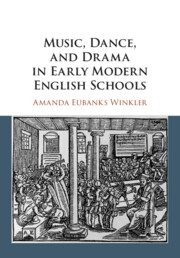Book contents
- Music, Dance, and Drama in Early Modern English Schools
- Music, Dance, and Drama in Early Modern English Schools
- Copyright page
- Dedication
- Contents
- Figures
- Tables
- Music Examples
- Preface
- Editorial Method
- Abbreviations and RISM Sigla
- Introduction
- 1 Situating Pedagogical Performance
- 2 Performing Piety
- 3 Performing Prestige
- 4 Performing Accomplishment
- 5 Performing Vice
- 6 Performing the Professional
- 7 Performing the Past: The Specter of the Schoolroom
- Bibliography
- Index
4 - Performing Accomplishment
Published online by Cambridge University Press: 14 May 2020
- Music, Dance, and Drama in Early Modern English Schools
- Music, Dance, and Drama in Early Modern English Schools
- Copyright page
- Dedication
- Contents
- Figures
- Tables
- Music Examples
- Preface
- Editorial Method
- Abbreviations and RISM Sigla
- Introduction
- 1 Situating Pedagogical Performance
- 2 Performing Piety
- 3 Performing Prestige
- 4 Performing Accomplishment
- 5 Performing Vice
- 6 Performing the Professional
- 7 Performing the Past: The Specter of the Schoolroom
- Bibliography
- Index
Summary
This chapter considers how schools defined, measured, and cultivated accomplishment in the performing arts through an analysis of pedagogical repertories associated with Mr. and Mrs. Perwich’s school in Hackney, John Maynard’s “School of St. Julian’s,” a music school in Aberdeen, and the famous boarding school at Chelsea, run first by Jeffrey Banister and James Hart and later by Josias Priest and his wife Franck. Sources associated with these institutions preserve traces of more intimate sorts of performance instruction in early modern English schools, cultivated in lessons between a student and teacher. These pedagogical approaches, the repertories produced, and the performing bodies involved, were sometimes captured in printed images, written descriptions, and musical notation, allowing those beyond the school to avail themselves of the same instruction in the privacy of their domestic spaces. In this way, the boundary blurred between schoolroom and domicile, as students at schools learned skills to provide entertainment at home and those at home played music by celebrated school-based instructors. The dissemination of pedagogical repertories also facilitated the effacement of gendered expectations about performance, for musicians of both genders read about and emulated the feats of accomplished musical women and performed repertories created for the opposite sex.
- Type
- Chapter
- Information
- Music, Dance, and Drama in Early Modern English Schools , pp. 100 - 130Publisher: Cambridge University PressPrint publication year: 2020



